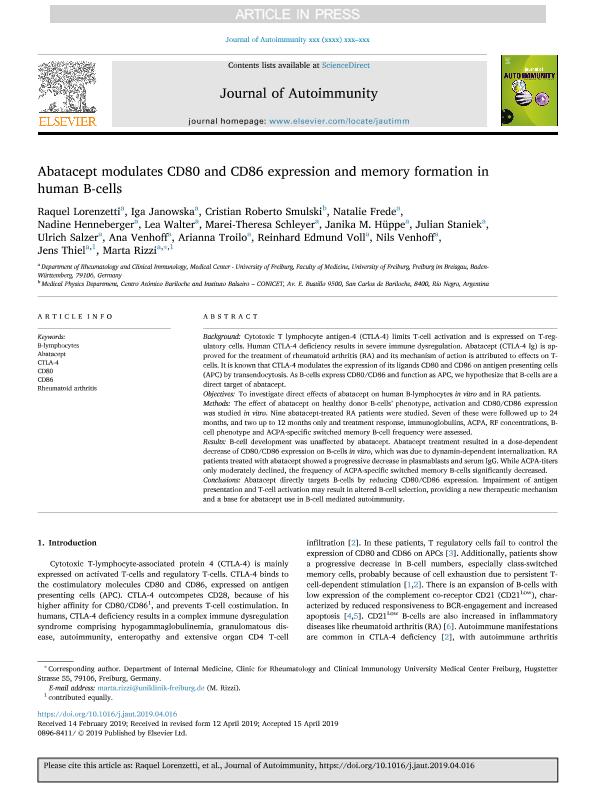Mostrar el registro sencillo del ítem
dc.contributor.author
Lorenzetti, Raquel
dc.contributor.author
Janowska, Iga
dc.contributor.author
Smulski, Cristian Roberto

dc.contributor.author
Frede, Natalie
dc.contributor.author
Henneberger, Nadine
dc.contributor.author
Walter, Lea
dc.contributor.author
Schleyer, Marei-Theresa
dc.contributor.author
Hüppe, Janika M.
dc.contributor.author
Staniek, Julian
dc.contributor.author
Salzer, Ulrich
dc.contributor.author
Venhoff, Ana
dc.contributor.author
Troilo, Arianna
dc.contributor.author
Voll, Reinhard Edmund
dc.contributor.author
Venhoff, Nils
dc.contributor.author
Thiel, Jens
dc.contributor.author
Rizzi, Marta
dc.date.available
2022-01-28T20:35:36Z
dc.date.issued
2019-07
dc.identifier.citation
Lorenzetti, Raquel; Janowska, Iga; Smulski, Cristian Roberto; Frede, Natalie; Henneberger, Nadine; et al.; Abatacept modulates CD80 and CD86 expression and memory formation in human B-cells; Academic Press Ltd - Elsevier Science Ltd; Journal of Autoimmunity; 101; 7-2019; 145-152
dc.identifier.issn
0896-8411
dc.identifier.uri
http://hdl.handle.net/11336/150925
dc.description.abstract
Background: Cytotoxic T lymphocyte antigen-4 (CTLA-4) limits T-cell activation and is expressed on T-regulatory cells. Human CTLA-4 deficiency results in severe immune dysregulation. Abatacept (CTLA-4 Ig) is approved for the treatment of rheumatoid arthritis (RA) and its mechanism of action is attributed to effects on T-cells. It is known that CTLA-4 modulates the expression of its ligands CD80 and CD86 on antigen presenting cells (APC) by transendocytosis. As B-cells express CD80/CD86 and function as APC, we hypothesize that B-cells are a direct target of abatacept.
Objectives: To investigate direct effects of abatacept on human B-lymphocytes in vitro and in RA patients.
Methods: The effect of abatacept on healthy donor B-cells’ phenotype, activation and CD80/CD86 expression was studied in vitro. Nine abatacept-treated RA patients were studied. Seven of these were followed up to 24 months, and two up to 12 months only and treatment response, immunoglobulins, ACPA, RF concentrations, B-cell phenotype and ACPA-specific switched memory B-cell frequency were assessed.
Results: B-cell development was unaffected by abatacept. Abatacept treatment resulted in a dose-dependent decrease of CD80/CD86 expression on B-cells in vitro, which was due to dynamin-dependent internalization. RA patients treated with abatacept showed a progressive decrease in plasmablasts and serum IgG. While ACPA-titers only moderately declined, the frequency of ACPA-specific switched memory B-cells significantly decreased.
Conclusions: Abatacept directly targets B-cells by reducing CD80/CD86 expression. Impairment of antigen presentation and T-cell activation may result in altered B-cell selection, providing a new therapeutic mechanism and a base for abatacept use in B-cell mediated autoimmunity.
dc.format
application/pdf
dc.language.iso
eng
dc.publisher
Academic Press Ltd - Elsevier Science Ltd

dc.rights
info:eu-repo/semantics/openAccess
dc.rights.uri
https://creativecommons.org/licenses/by-nc-nd/2.5/ar/
dc.subject
ABATACEPT
dc.subject
B-LYMPHOCYTES
dc.subject
CD80
dc.subject
CD86
dc.subject
CTLA-4
dc.subject
RHEUMATOID ARTHRITIS
dc.subject.classification
Otras Ciencias Biológicas

dc.subject.classification
Ciencias Biológicas

dc.subject.classification
CIENCIAS NATURALES Y EXACTAS

dc.title
Abatacept modulates CD80 and CD86 expression and memory formation in human B-cells
dc.type
info:eu-repo/semantics/article
dc.type
info:ar-repo/semantics/artículo
dc.type
info:eu-repo/semantics/publishedVersion
dc.date.updated
2022-01-25T14:38:11Z
dc.journal.volume
101
dc.journal.pagination
145-152
dc.journal.pais
Estados Unidos

dc.description.fil
Fil: Lorenzetti, Raquel. Albert Ludwigs University of Freiburg; Alemania
dc.description.fil
Fil: Janowska, Iga. Albert Ludwigs University of Freiburg; Alemania
dc.description.fil
Fil: Smulski, Cristian Roberto. Consejo Nacional de Investigaciones Científicas y Técnicas. Centro Científico Tecnológico Conicet - Patagonia Norte; Argentina. Comisión Nacional de Energía Atómica. Centro Atómico Bariloche; Argentina. Comisión Nacional de Energía Atómica. Gerencia del Área de Energía Nuclear. Instituto Balseiro; Argentina
dc.description.fil
Fil: Frede, Natalie. Albert Ludwigs University of Freiburg; Alemania
dc.description.fil
Fil: Henneberger, Nadine. Albert Ludwigs University of Freiburg; Alemania
dc.description.fil
Fil: Walter, Lea. Albert Ludwigs University of Freiburg; Alemania
dc.description.fil
Fil: Schleyer, Marei-Theresa. Albert Ludwigs University of Freiburg; Alemania
dc.description.fil
Fil: Hüppe, Janika M.. Albert Ludwigs University of Freiburg; Alemania
dc.description.fil
Fil: Staniek, Julian. Albert Ludwigs University of Freiburg; Alemania
dc.description.fil
Fil: Salzer, Ulrich. Albert Ludwigs University of Freiburg; Alemania
dc.description.fil
Fil: Venhoff, Ana. Albert Ludwigs University of Freiburg; Alemania
dc.description.fil
Fil: Troilo, Arianna. Albert Ludwigs University of Freiburg; Alemania
dc.description.fil
Fil: Voll, Reinhard Edmund. Albert Ludwigs University of Freiburg; Alemania
dc.description.fil
Fil: Venhoff, Nils. Albert Ludwigs University of Freiburg; Alemania
dc.description.fil
Fil: Thiel, Jens. Albert Ludwigs University of Freiburg; Alemania
dc.description.fil
Fil: Rizzi, Marta. Albert Ludwigs University of Freiburg; Alemania
dc.journal.title
Journal of Autoimmunity

dc.relation.alternativeid
info:eu-repo/semantics/altIdentifier/url/https://www.sciencedirect.com/science/article/pii/S0896841119300897
dc.relation.alternativeid
info:eu-repo/semantics/altIdentifier/doi/http://dx.doi.org/10.1016/j.jaut.2019.04.016
Archivos asociados
